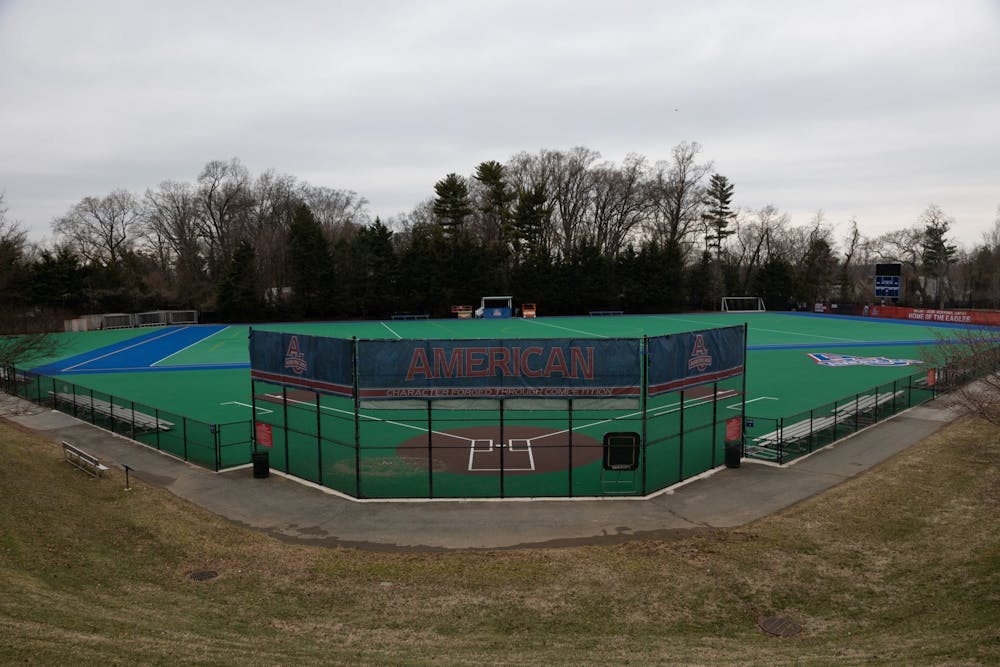For the various club sports teams at American University, specifically field sports, scheduling field space and practice time is a regular obstacle.
AU has three fields available for sports teams to use: the William I. Jacobs Recreational Complex, the Greenberg Track and Reeves Athletic Complex and the Massachusetts Avenue field. Only one of these spaces, the Jacobs Complex, is turf and there is only one track available for AU student-athletes.
With 14 varsity sports teams, eight of which use field or track space, and 25 club sports teams with 11 requiring the use of a field or track, as well as intramural teams and events, scheduling an adequate amount of practice time for club sports teams is a challenge.
According to Paul Sutton, a senior in the School of International Service and the College of Arts and Sciences and the president of the men’s club soccer team, his team has had to practice on fields that are not meant for its sport due to scheduling issues.
“Particularly for soccer, for example, we practice on Jacobs field hockey field … but field hockey turf is not at all like any normal turf,” Sutton said. “It is very, very short. It’s meant for field hockey and field hockey only.”
Club sports athletes like Sutton are playing on a field that is unlike what they will compete on for games, and are unable to wear soccer cleats while practicing for fear of damaging the field.
During their spring season, the club soccer team has only been able to get practice time once a week for two hours, even with games coming up in the next few weekends.
“It’s just like we have an allotted time to use their fields and other than that, we have no access and that means a lot of things,” Sutton said. “It keeps us from being able to practice and stay competitive in our league.”
The limited number of accessible fields and the lack of lighting on the Jacobs Complex for nighttime practices contribute to this restricted scheduling time.
Much of the problem, for Sutton, stems from the lack of trust that he feels the varsity staff and the broader athletic department have for club sports.
Athletic department’s role
Garrett Schmidt, the assistant director of competitive sports and aquatics, works directly with club sports teams in a variety of ways, including the reservation of practice times. Schmidt said that club sports are usually allotted thirty schedulable hours on the Jacobs Complex per week. This does not include the scheduling of games or other sports-specific resources available including the Bender Arena, the Massachusetts Avenue field, tennis courts and group exercise studios.
The grass fields, Reeves and Massachusetts Avenue, are scheduled differently because of the wear and tear that can happen due to overuse of the fields. Schmidt said Reeves Field is typically not available for club sports since it is scheduled to capacity with AU’s varsity soccer teams, but the Massachusetts Ave field is sometimes open for limited practice time. More variables, though, affect that field’s variability such as type of sport and weather.
The University uses the online portal Do Sports Easy for the scheduling of club sports practices throughout the fall and spring semesters. One of the major issues with this process is that Schmidt must individually enter each team’s availability into the system and wait for the registration to be approved.
“One thing that probably is the largest obstacle for clubs right now is just life during a pandemic, and resuming operations after what is like a complete pause, due to the various waves that we're experiencing,” Schmidt said. “But I will say that a lot of the students at American have been able to embrace that challenge and really thrive with it.”
Concerns of club sports student-athletes
Ally Fox, a sophomore in the School of Public Affairs, is a co-president of the club cross country track and field team. She said that her team has run into issues communicating with Schmidt and the varsity track and cross country coaches when trying to reserve time on the track.
“I’m just sitting here waiting with anxiety, like, ‘Are we going to get the track space?’” Fox said.
Fox said she wishes the University could provide direct communication between the club sports and varsity teams so that each party could know when the track is open, allowing for greater utilization of the shared resource.
Ginger Schwarz, a graduate student, is the founder and captain of the women’s club lacrosse team. She echoed the sentiment that many club teams have to share their limited time on the field with other teams.
For women’s club lacrosse, they often have to share the field with club field hockey or, more recently, women’s club rugby. Schwarz said that she appreciates having a wide variety of club sports teams on campus, but would like to see scheduling efforts become more organized.
“I wouldn’t want any less teams than there are. It’s great having the number of teams that we do,” Schwarz said. “I just really think it is a matter of resources and field space and the timing of it.”
Sutton called on the University to expand resources available to club athletes.
“It is beyond me that AU, with as many amenities that we have for varsity athletes, that they can’t manage to share those with responsible, well-led, intelligent students who are just looking for a place to play,” Sutton said.





